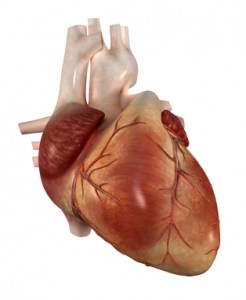Red Meat Interacts with Bacteria in the Gut to Raise Heart Disease Risk
 A 2018 study by a group of researchers at the Cleveland Clinic have clarified the way that a diet heavy in red meat may lead to heart disease. The research centers on trimethylamine N-oxide (TMAO), a gut bacteria byproduct that is formed during digestion. When gut bacteria digest choline, lecithin, and carnitine, nutrients that are common in certain animal products and red meat, TMAO is produced.
A 2018 study by a group of researchers at the Cleveland Clinic have clarified the way that a diet heavy in red meat may lead to heart disease. The research centers on trimethylamine N-oxide (TMAO), a gut bacteria byproduct that is formed during digestion. When gut bacteria digest choline, lecithin, and carnitine, nutrients that are common in certain animal products and red meat, TMAO is produced.
In an article by Robert A. Koeth and colleagues in the European Heart Journal, the researchers show that diets that rely on red meat as the main protein source lead to more circulating TMAO than diets in which white meat or something other than meat is the primary source of protein. They found that in people who eat a lot of red meat, the kidneys are less efficient at expelling TMAO, and levels creep even higher. High levels of TMAO have been linked to hardening and narrowing of the arteries (atherosclerosis) and heart disease complications. High levels of TMAO in the blood can be a predictor of heart attack, stroke, and death.
The study of 113 participants consisted of three different diets that each participant followed in random order (with a washout period in between each diet). A month of eating a diet in which red meat was responsible for at least 25% of participants’ daily calories led to higher levels of TMAO in the blood and urine. TMAO increased threefold during the red meat diet periods compared to periods in which white meat or non-meat protein were the source of those calories, and in certain participants, TMAO increased as much as tenfold. When participants stopped eating the red meat diet, their TMAO levels fell over the following month.
Marker of Heart Failure May Predict Brain Deterioration
 A protein released into the blood in response to heart failure may be able to predict brain deterioration before clinical symptoms appear. The protein, N-terminal pro-B-type natriuretic peptide (NT-proBNP), is released when cardiac walls are under stress. High levels of NT-proBNP in the blood are a sign of heart disease. A 2016 Dutch study indicated that high levels of NT-proBNP in the blood are also linked to smaller brain volume, particularly small gray matter volume, and to poorer organization of the brain’s white matter. The study by researcher Hazel I. Zonneveld and colleagues, published in the journal Neuroradiology, assessed heart and brain health in 2,397 middle-aged and elderly people with no diagnosed heart or cognitive problems.
A protein released into the blood in response to heart failure may be able to predict brain deterioration before clinical symptoms appear. The protein, N-terminal pro-B-type natriuretic peptide (NT-proBNP), is released when cardiac walls are under stress. High levels of NT-proBNP in the blood are a sign of heart disease. A 2016 Dutch study indicated that high levels of NT-proBNP in the blood are also linked to smaller brain volume, particularly small gray matter volume, and to poorer organization of the brain’s white matter. The study by researcher Hazel I. Zonneveld and colleagues, published in the journal Neuroradiology, assessed heart and brain health in 2,397 middle-aged and elderly people with no diagnosed heart or cognitive problems.
Researchers are working to clarify the relationship between cardiac dysfunction and preliminary brain disease, but researcher Meike Vernooij says it is likely cardiac dysfunction comes first and leads to brain damage. Measuring biomarkers such as NT-proBNP may help identify brain diseases such as stroke and dementia earlier and allow for earlier treatment and lifestyle changes that can slow or reverse the course of disease.
Depression Increases Heart Disease Risk to Same Extent That Obesity, High Cholesterol Do
 In men, depression seems to be equal to obesity and high cholesterol in increasing heart disease risk. A German study about heart disease risk included 3,428 men between the ages of 45 and 74 who were observed over a period of 10 years.
In men, depression seems to be equal to obesity and high cholesterol in increasing heart disease risk. A German study about heart disease risk included 3,428 men between the ages of 45 and 74 who were observed over a period of 10 years.
In an article in the journal Atherosclerosis, lead researcher Karl-Heinz Ladwig reported that while high blood pressure and smoking are the most powerful risk factors for fatal cardiovascular disease, depression is comparable to obesity and high cholesterol levels. Depression accounts for about 15% of cardiovascular deaths.
Ladwig suggests that depression screening should be standard in patients with other risk factors for heart disease.
Editor’s Note: Long-term preventive treatment for depression may have the added benefit of preventing heart attacks. In people with two prior depressions, most guidelines now recommend lifetime continuation of antidepressant treatment.
High Level of Calcium Intake and Supplements May Be Harmful
 In a study of over 60,000 women, Swedish researcher Karl Michaëlsson et al. found that those women with the highest intakes of calcium (>1400mg/day) were at higher risk of mortality, particularly from cardiovascular causes such as cardiovascular disease and heart disease (but not stroke), than women with calcium intakes of between 600 and 1000mg/day. The research was published in the journal BMJ in 2013.
In a study of over 60,000 women, Swedish researcher Karl Michaëlsson et al. found that those women with the highest intakes of calcium (>1400mg/day) were at higher risk of mortality, particularly from cardiovascular causes such as cardiovascular disease and heart disease (but not stroke), than women with calcium intakes of between 600 and 1000mg/day. The research was published in the journal BMJ in 2013.
While calcium dietary supplements were not associated with elevated risk per se, those women with the highest calcium intake levels who also took supplements had a risk of mortality from all causes that was more than 2.5 times that of women with similar total calcium intake who did not take supplements.
Calcium levels in blood are tightly controlled by the body, but very low or very high calcium intake levels can override this control, causing imbalances.
The efficacy of calcium supplements for conditions such as osteoporosis or chronic kidney disease has not been established, and a healthy balanced diet and avoidance of water filters that remove calcium from drinking water may be best.

